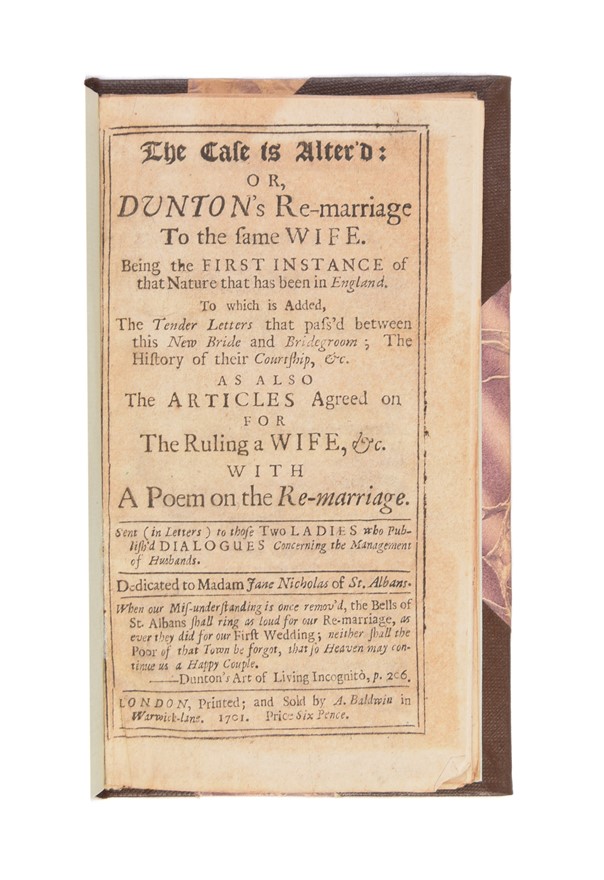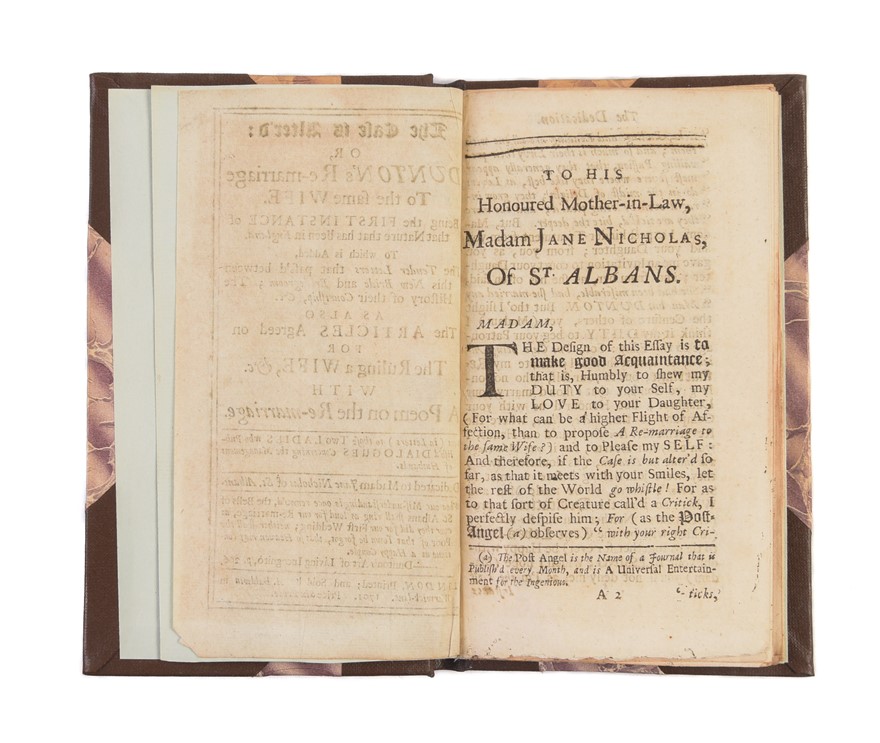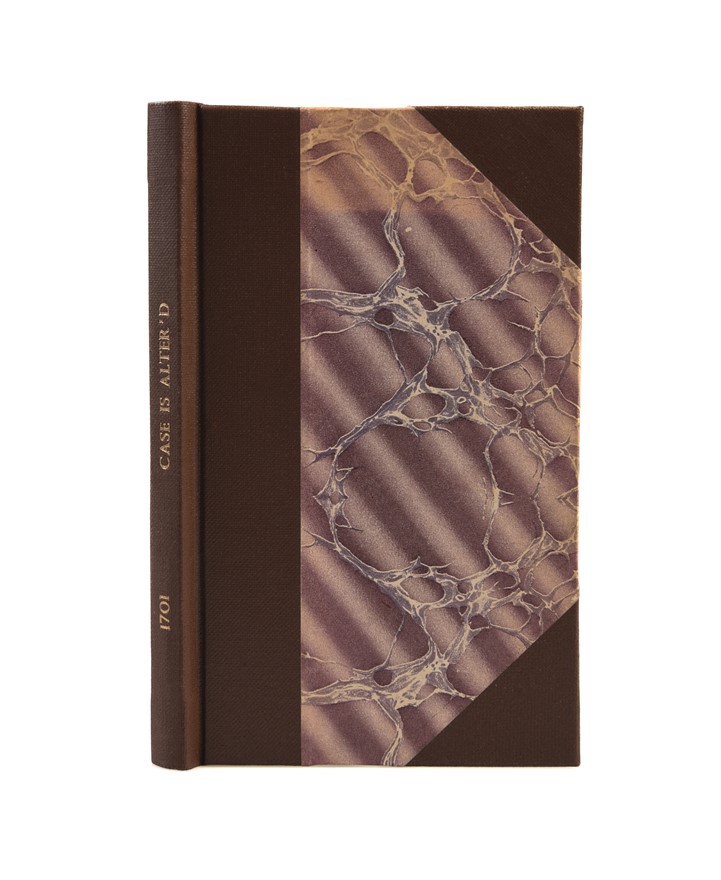The Case is Alter'd.: or, Dunton's re-marriage to the same wife.
DUNTON John (1701)
£3500.00 [First Edition]
Please contact us in advance if you would like to view this book at our Curzon Street shop.
"FOR WHAT COULD BE A HIGHER FLIGHT OF AFFECTION, THAN TO PROPOSE A RE-MARRIAGE TO THE SAME WIFE?"
First Edition. Small 8vo (165mm x 100mm). [20] 56pp. A little browned in places and with a few spots but otherwise fine. Modern (ugly) brown cloth-backed marbled boards, spine lettered in gilt.
London: A. Baldwin,
Rare. ESTC records three copies: BL, Bodley and UCLA. No copies recorded on Rare Book Hub.
A series of odd letters by the bookseller John Dunton on his efforts to re-marry his wife, who had seized his bookshop and left him in crushing debt.
John Dunton (1659-1732) was an eccentric publisher and bookseller who conceived the innovative periodical The Athenian Gazette which encouraged readers to submit questions to a panel of learned men termed the 'Athenian Society'.
From the late 1690s onwards, however, Dunton's fortunes began to decline. In May 1697, his wife Elizabeth died, and in October he married Sarah Nicholas of St Albans. This swift re-marriage appears to have been motivated primarily by Dunton's awareness of Nicholas's wealthy mother, Jane. Elizabeth seems to have checked many of Dunton's more eccentric business decisions, and in the years after her death, his publishing business began to lose money. Following the marriage, however, Dunton's new mother-in-law refused to cover his losses, and his new wife exerted a compelling claim over his remaining property (see J. Paul Hunter, The Insistent I (1979) p.29). The union quickly disintegrated, with the Nicholas' colonising Dunton's bookshop, and he issued several vitriolic pamphlets against his wife and her mother (ODNB; Hunter, p.31).
By 1701, however, his position had clearly changed. In this volume, Dunton collects various documents in support of his proposed re-marriage to Sarah Nicholas. The volume begins with a lengthy dedication to his former mother-in-law, in which Dunton solicits her blessing for the remarriage. The bulk of the volume, however, consists of two addresses to "Those two ladies who publish'd dialogues concerning the management of husbands." In these letters, Dunton outlines his marriage to Sarah Nicholas, its dissolution, and his fresh efforts to court her, before supplying his analysis of the duties and techniques for spousal control within a marriage. These addresses also, ostensibly, reproduce correspondence between Dunton and his second wife, while the first section of the dedication similarly reproduces a vicar's letter to Jane Nicholas in support of Dunton. Finally, the volume also contains a poem entitled "The Conjugal Amour."
This volume is consciously framed as a sequel to Dunton's earlier pamphlet The Case of John Dunton, published in 1700. In that tract, Dunton took his grievances public in the dubious hope of humiliating his wife and her mother into paying what he believed he was owed. The contrast in approach between the two volumes is considerable, and attests to Dunton's rather tenuous grasp of reality - or, at least, the reality which he sought to depict in print. J. Paul Hunter has identified the letter from a concerned well-wisher in the 1700 pamphlet as written by Dunton himself, and, given the breakdown in their relationship up to that point, the gushing letters from Sarah Nicholas in the present volume are highly suspect (Hunter, Insistent I, 31). The response of the Nicholas's to Dunton's volume, if any, has not survived - but, unsurprisingly, no reconciliation or re-marriage was forthcoming.
In recent years, Dunton has received steady attention from scholars of seventeenth and eighteenth-century publishing. In these studies, Dunton's significance lies in his innovative approach not only to literary genres, but to literary presentation within these genres. It is in connection with literary presentation that the present volume is of interest. The Case is Alter'd is a vivid example of what Robert Adams Day has called 'I-Think' - "authentically subjective self-expression, unmediated by the elaborate strategies of rhetoric" - made possible by the rise of cheap and (relatively) uncensored publishing (Day, Richard Bentley and John Dunton: Brothers under the Skin (1987), 128). In the analysis of Day, J. Paul Hunter, and Peter M. Briggs, Dunton relied on his publications to live a better life through print than he was able to in reality - as, presumably, with the letters from Sarah Nicholas in the present volume. The result of this is a naked foregrounding of personal experience, and language which is exuberant, colloquial, embarrassingly frank and breathlessly intimate - all of which runs throughout The Case is Alter'd.
Consequently, The Case is Alter'd is of interest as an early and imperfect example of the individualism and subjectivity that would come to define the eighteenth-century novel.
Equally, it is vivid and exuberant evidence of the personal and emotional life of a leading late-seventeenth-century London bookseller. In the sections discussing spousal duties, and in Dunton's pre-emptive justifications of his attempt to re-marry Sarah Nicholas, it is of interest as evidence of eighteenth-century marital conventions and attitudes.
Stock Code: 249987






